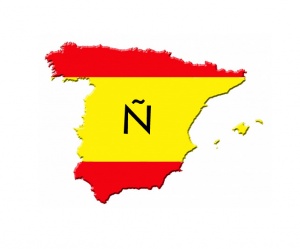Language/Spanish/Pronunciation/Alphabet-and-Pronunciation
Hi, guys!
In this section I will show you one of the most basic things you need to know in any language: the alphabet.
I will teach you which are the letters that make up the alphabet.
So, I hope to be of help.
Good luck.
| Letter | Name | Pronunciation | Exceptions |
|---|---|---|---|
| A a | a | /a/ | |
| B b | be, be larga | /b/, /β/ | |
| C c | ce | /k/, /θ/ | |
| CH ch | che | /ʧ/ | *According to the Spanish Royal Academy (SRA)
It is no longer part of the Spanish alphabet. |
| D d | de | /d/ | |
| E e | e | /e/ | |
| F f | efe | /f/ | |
| G g | ge | /ɡ/, /x/ | |
| H h | hache | Ø | |
| I i | i | /i/ | |
| J j | jota | /x/ | |
| K k | ka | /k/ | |
| L l | ele | /l/ | |
| LL ll | elle | /ʎ/ | *According to the Spanish Royal Academy (SRA)
It is no longer part of the Spanish alphabet. |
| M m | eme | /m/ | |
| N n | ene | /n/ | |
| Ñ ñ | eñe | /ɲ/ | |
| O o | o | /o/ | |
| P p | pe | /p/ | |
| Q q | cu | /k/ | |
| R r | erre | /ɾ/, /r/ | |
| S s | ese | /s/ | |
| T t | te | /t/ | |
| U u | u | /u/ | |
| V v | uve - ve - ve corta | /b/ | |
| W w | uve doble, doble u, doble ve | /w/, /b/ | |
| X x | equis | /ks/, /x/, /s/ | |
| Y y | i igriega, ye | /ʝ/, /i/ | |
| Z z | zeta | /θ/ |
*Exceptions information: http://www.rae.es/consultas/exclusion-de-ch-y-ll-del-abecedario
Video
Learn with a song! ;)
The R for English Speakers
What works for some English speakers (even if it may not be technically correct) is to shape the lips something like the sound that is made for the English "r," but to make the sound with a single trill or flap of the tongue against the front of the palate. Actually, it's probably best not to think English "r" at all; the sounds of the two languages really are different. And if it's any consolation, the sound of the English "r" is more difficult for native Spanish speakers (and speakers of many other languages) to master than it is for English speakers to master the Spanish r.
You can hear the r pronounced by native speakers in our audio lesson on pronouncing the r. Words spoken in that lesson are pero (but), caro (expensive), primo (cousin), tres (three), señor (Mr.) and hablar (to speak).
Recommendations From the Community
Participants in our forum have discussed pronunciation of the r, especially when it comes after a consonant, as in abra. Here's some of their advice:
- "You can try substituting the English letter 'd' for a single r. For example: Pero(Spanish) = Pedo (English). If you say it quickly it begins to take on the character of the Spanish r. I learned this from a friend from Colombia whose name was Miriam. She hated the swallowed 'r' that Americans make when they say her name, so she suggested that they call her Medium. Said quickly, that was much closer to the Spanish pronunciation of Miriam."
- "When you say the word 'throw' you have to put your tongue in almost the same position as you do when you make the Spanish r sound. Try that for positioning your tongue, then just blow real hard and your tongue will vibrate like it's supposed to do for those rolling rrs. Once you have the tongue vibrating, make a growling sound like 'rrrrrrr.'"
- "If you pronounce the t and d as they are pronounced in Spanish with the tip of the tongue on or near the top of the upper front teeth instead of farther up on the alveolar ridge as we usually do in English, then to get to the r you only have to flip it up a little. Anyway, you can solace that Spanish doesn't have those impossible consonant combinations that some languages have. (I knew a guy from Africa whose first name was Ngmpu. Try that one!")
- "If you can already make the r sound when surrounded by vowels, then stick in a vowel at first — u works the best. Practice saying abura a bunch of times, gradually emphasizing the u less and less until you're just saying abra."
- "I don't think I have any trouble with r as in abra, or at least no native speaker has ever told me that my pronunciation of it sounds bad. If you've got the r of para or caro down, it's exactly the same as that; flap your tongue right after the consonant. In other words, try saying ohtda as though it were an English word very quickly (of course, your tongue should touch the back of your front teeth when you say the t) and you will probably get the word otra right." [Gerald Erichsen].


